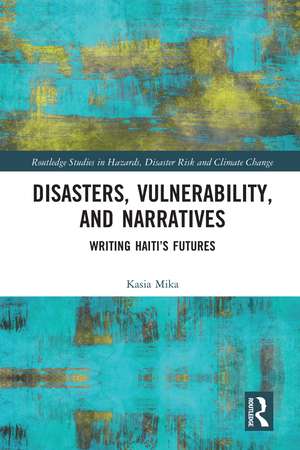Disasters, Vulnerability, and Narratives: Writing Haiti’s Futures: Routledge Studies in Hazards, Disaster Risk and Climate Change
Autor Kasia Mikaen Limba Engleză Paperback – 30 iun 2020
This book focuses on a vision of an open-ended future, otherwise than as a threat or fear. Mika turns to concepts of hinged chronologies, slow healing and remnant dwelling. Weaving theory with attentive close-readings, the book offers an open-ended framework for conceptualising post-disaster recovery and healing. These processes happen at different times and must entail the elimination of compound vulnerabilities that created the disaster in the first place. Challenging characterisations of the region as a continuous catastrophe this book works towards a bold vision of Haiti’s and the Caribbean’s futures.
The study shows how narratives can extend some of the key concepts within discipline-bound approaches to disasters, while making an important contribution to the interface between disaster studies, postcolonial ecocriticism and Haitian Studies.
Din seria Routledge Studies in Hazards, Disaster Risk and Climate Change
-
 Preț: 311.41 lei
Preț: 311.41 lei - 8%
 Preț: 390.50 lei
Preț: 390.50 lei -
 Preț: 287.86 lei
Preț: 287.86 lei - 9%
 Preț: 934.94 lei
Preț: 934.94 lei -
 Preț: 296.84 lei
Preț: 296.84 lei -
 Preț: 278.13 lei
Preț: 278.13 lei -
 Preț: 465.39 lei
Preț: 465.39 lei -
 Preț: 389.66 lei
Preț: 389.66 lei - 18%
 Preț: 138.22 lei
Preț: 138.22 lei -
 Preț: 384.86 lei
Preț: 384.86 lei -
 Preț: 413.33 lei
Preț: 413.33 lei -
 Preț: 389.66 lei
Preț: 389.66 lei -
 Preț: 385.62 lei
Preț: 385.62 lei - 18%
 Preț: 1000.89 lei
Preț: 1000.89 lei - 18%
 Preț: 896.71 lei
Preț: 896.71 lei -
 Preț: 416.22 lei
Preț: 416.22 lei -
 Preț: 389.38 lei
Preț: 389.38 lei - 18%
 Preț: 1000.27 lei
Preț: 1000.27 lei -
 Preț: 385.08 lei
Preț: 385.08 lei - 18%
 Preț: 1002.60 lei
Preț: 1002.60 lei -
 Preț: 385.02 lei
Preț: 385.02 lei -
 Preț: 390.41 lei
Preț: 390.41 lei -
 Preț: 420.76 lei
Preț: 420.76 lei -
 Preț: 383.17 lei
Preț: 383.17 lei - 19%
 Preț: 272.06 lei
Preț: 272.06 lei -
 Preț: 453.53 lei
Preț: 453.53 lei -
 Preț: 286.20 lei
Preț: 286.20 lei - 18%
 Preț: 1001.84 lei
Preț: 1001.84 lei - 15%
 Preț: 475.62 lei
Preț: 475.62 lei - 18%
 Preț: 893.27 lei
Preț: 893.27 lei - 17%
 Preț: 272.64 lei
Preț: 272.64 lei
Preț: 272.50 lei
Preț vechi: 326.49 lei
-17% Nou
Puncte Express: 409
Preț estimativ în valută:
52.14€ • 54.58$ • 43.40£
52.14€ • 54.58$ • 43.40£
Carte tipărită la comandă
Livrare economică 31 martie-14 aprilie
Preluare comenzi: 021 569.72.76
Specificații
ISBN-13: 9780367588496
ISBN-10: 0367588498
Pagini: 244
Dimensiuni: 156 x 234 mm
Greutate: 0.45 kg
Ediția:1
Editura: Taylor & Francis
Colecția Routledge
Seria Routledge Studies in Hazards, Disaster Risk and Climate Change
Locul publicării:Oxford, United Kingdom
ISBN-10: 0367588498
Pagini: 244
Dimensiuni: 156 x 234 mm
Greutate: 0.45 kg
Ediția:1
Editura: Taylor & Francis
Colecția Routledge
Seria Routledge Studies in Hazards, Disaster Risk and Climate Change
Locul publicării:Oxford, United Kingdom
Public țintă
Postgraduate and UndergraduateCuprins
PART I: DISASTER MAKING 1. January 12 2010: From Hazard to Disaster 2. Disaster’s Past, Present and Future: Beyond Exposure, Failure and Resilience 3. Rasanblaj: Scholarship of Care PART II: DISASTER TIME 4. Halting the Tremors 5. Recalling History and Reimagining the Future PART III: DISASTER SPACE 6. Navigating Through the Rubble 7. Future Rebuilding and Reconstructions PART IV: DISASTER SELVES 8. Narrating Conversion and Rescue 9. Imagining Novel Lives Rasanblaj: A Future Reassembled
Notă biografică
Kasia Mika is a Lecturer in Comparative Literature at Queen Mary University London. Her research focuses on disaster studies, postcolonial approaches to environmental and medical humanities, and Caribbean and island studies. In Disasters, Vulnerability, and Narratives: Writing Haiti’s Futures (Routledge 2019), she turns to narratives of the 2010 Haiti earthquake to conceptualize hinged chronologies, slow healing, and remnant dwelling. Building on this work, she has produced a short documentary, Intranqu’îllités (2019; dir. Ed Owles), on art and creativity in Haiti (AHRC Research in Film Award 2019). Her articles appeared in: Area, The Journal of Haitian Studies, Moving Worlds, Modern and Contemporary France.
Recenzii
"In Disasters, Vulnerability, and Narratives: Writing Haiti’s Futures, Kasia Mika makes an important contribution to the still-emerging archive of experience of the Haitian earthquake. In Mika’s critical reading of a cross-section of fictional and nonfictional accounts, we get a "bold, future-oriented" account of the catastrophe." Greg Beckett, Author of There Is No More Haiti.
Descriere
This book offers an interdisciplinary discussion of a wide range of narrative responses to the 2010 earthquake in Haiti. By putting postcolonial literary studies in dialogue with disaster studies, the monograph excavates the multiple tensions within these narratives, while also demonstrating how together they can help us to navigate the complicated past, present, and future of this and other similarly complex disasters. This book examines the potentials and limitations of these texts as they attempt to forge a narrative form that approximates the experience of the event challenging, in the process, current definitions of ‘disaster’, ‘reconstruction’, and ‘recovery.’
